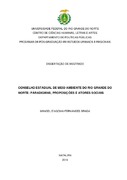Please use this identifier to cite or link to this item:
https://repositorio.ufrn.br/handle/123456789/19574| Title: | Conselho estadual de meio ambiente do Rio Grande do Norte: paradigmas, proposições e atores sociais |
| Authors: | Braga, Manoel D'agonia Fernandes |
| Advisor: | Figueiredo, Fábio Fonseca |
| Keywords: | Conema/RN;Atores sociais;Deliberação;Participação;Política ambiental |
| Issue Date: | 29-Sep-2014 |
| Publisher: | Universidade Federal do Rio Grande do Norte |
| Citation: | BRAGA, Manoel D'agonia Fernandes. Conselho estadual de meio ambiente do Rio Grande do Norte: paradigmas, proposições e atores sociais. 2014. 105f. Dissertação (Mestrado em Estudos Urbanos e Regionais) - Centro de Ciências Humanas, Letras e Artes, Universidade Federal do Rio Grande do Norte, Natal, 2014. |
| Portuguese Abstract: | O movimento ambientalista manifesta-se com maior força no ano de 1972 com a Conferência de Estocolmo, frente às pressões para a preservação do meio ambiente em decorrência das catástrofes ambientais. Destarte que no Brasil, o movimento ambiental se institucionaliza com a Constituição de 1988, uma vez que os conselhos se firmaram como espaços democráticos, e prevê a participação da sociedade na gestão das políticas públicas. Nesse diapasão propomos uma discussão sob a luz da participação e exercício da cidadania no Conselho Estadual de Meio Ambiente do Rio Grande do Norte (CONEMA/RN), focando o olhar sobre o processo decisório, a partir da manifestação dos atores sociais. Para tanto, nosso estudo compilou as atas de reuniões desse conselho, transcrevendo as principais discussões das demandas ambientais que marcam a sociedade potiguar, verificando como esses personagens se manifestaram no decorrer das reuniões. Com base nessas informações, compreendeu-se a atribuição do CONEMA/RN, como mecanismo de comunicação entre Estado e Sociedade. Com base na análise das atas de reuniões ordinárias entre 2007 a 2014, concluímos que o CONEMA é um conselho em que a sociedade civil organizada participa do processo decisório, apesar da acentuada influência dos atores representantes do poder público sobre os atores que representam a sociedade civil. Os resultados do estudo aqui desenvolvido confirmam a discrepância entre a participação dos conselheiros representantes do poder público e dos conselheiros representantes da sociedade civil dentro do CONEMA/RN. A conclusão aponta que os representantes da sociedade civil ainda não assimilaram o dever de cidadão, a responsabilidade de sua atuação, gerando prejuízos para o aparato legal da legislação ambiental potiguar, com reflexos negativos na implementação de políticas públicas |
| Abstract: | The environmental movement rises up strongly in the year 1972 with the Stocolmus Conference, in the middle of pressions concerning the environmental preservation, in consequence of the environmental catastrophes. In spite of the fact that, in Brazil, the environmental movement has is institutionalization with the 1988 Constitution, in a way that the councils became democratic spaces, and provided the society’s participation in the management of public policies. In this way, we propose a discussion about the participation and the exercise of the citizenship in the State Council of Environment of Rio Grande do Norte (CONEMA), focusing the glance about the decisory process, as from the expression of the social actors. For that, our research compilate documents of the meetings of the referring council, transcribing the main discussions about the environmental necessities which were important in the potiguar society, and checking how these agents defend their interest during the meetings. We understand, with these informations, the role of CONEMA/RN as a communicative mechanism between State and Society. With the analysis of the informations of the extraordinary meetings from 2007 to 2014, we concluded that the CONEMA is a council where the civil organized society takes part on the decisory process, despite the great influence of the representative actors of public power over the representative actors of civil society. The results of this research confirm the discrepancy between the participation of representative councilors of civil society in CONEMA/RN. The conclusion point out that the civil society representative don’t, yet, assimilate the citizen duty, the responsibility of it1s action, producing, in this way, damages for the legal structure of the potiguar environmental legislation, with serious consequences on the public policy implementation |
| URI: | https://repositorio.ufrn.br/jspui/handle/123456789/19574 |
| Appears in Collections: | PPGEUR - Mestrado em Estudos Urbanos e Regionais |
Files in This Item:
| File | Description | Size | Format | |
|---|---|---|---|---|
| ManoelDagoniaFernandesBraga_DISSERT.pdf | 1,03 MB | Adobe PDF |  View/Open |
Items in DSpace are protected by copyright, with all rights reserved, unless otherwise indicated.

